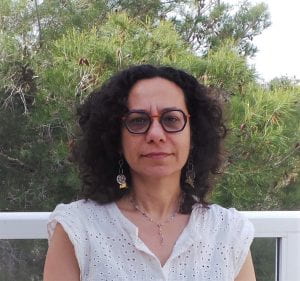March 30, 2021
Event Time: 2pm – 3.30pm
Virtual Event: You must register in advance at:
Dr. Sarai B. Aharoni, Lecturer, Gender Studies Program, Ben-Gurion University of the Negev
Abstract:
The lecture will follow the historical transformation of women’s peace activism in Israel from the late 1970s to the present. It will explore the changes in the field and the gradual shift from grassroots protest activities (vigils, demonstrations, petitions) toward community organizing (dialogue groups, educational projects) and professional policy-oriented projects (legislation, appeals, national planning). Through the story of the creation of the Feminist Peace Archives and the various documents and material objects that have been deposited and rescued over time, the lecture will also address broader concepts of empowerment, success and failure over time. Given the failed attempts to resolve the Israeli-Palestinian conflict, the conversation will look at how these concepts relate to hope and despair. As such, the possibility to conserve memory, interpret narratives and accept multiple voices and experiences of peace and resistance will be explored as a form of activism.
Speaker Bio:
 Sarai B. Aharoni (PhD) is a lecturer in the Gender Studies Program at Ben-Gurion University of the Negev. Previously, she was a visiting fellow at the University of Michigan and a postdoctoral fellow at the Hebrew University and the University of Haifa.
Sarai B. Aharoni (PhD) is a lecturer in the Gender Studies Program at Ben-Gurion University of the Negev. Previously, she was a visiting fellow at the University of Michigan and a postdoctoral fellow at the Hebrew University and the University of Haifa.
Her research interests include: Women, Peace and Security (WPS); feminist security studies; histories of women’s policy agencies and feminist movements in Israel. Her work has been published in various journals including Politics & Gender, Social Politics, Security Dialogue, International Feminist Journal of Politics, International Political Sociology, Mediterranean Historical Review and Cooperation & Conflict. During 2018-2020 Sarai published original computerized dataset (together with Dr. Yael Hasson) of Women’s Policy Agencies and State Feminism in Israel 1970-2018 (WPA-IL), to document the trends in development of various mechanisms for gender equality overtime. As a longtime scholar-activist, she was involved in various civil society initiatives and is one of the founding members of the Haifa Feminist Institute (HFI), an independent feminist archive, library and research center that seeks to enhance local feminist voices and histories.
About the Author:
 Kate Seaman is the Assistant Director to the Bahá’í Chair for World Peace where she supports the research activities of the Chair. Kate is interested in understanding normative changes at the global level and how these changes impact on the creation of peace.
Kate Seaman is the Assistant Director to the Bahá’í Chair for World Peace where she supports the research activities of the Chair. Kate is interested in understanding normative changes at the global level and how these changes impact on the creation of peace.
You can find out more about the Bahá’í Chair by watching our video here.
